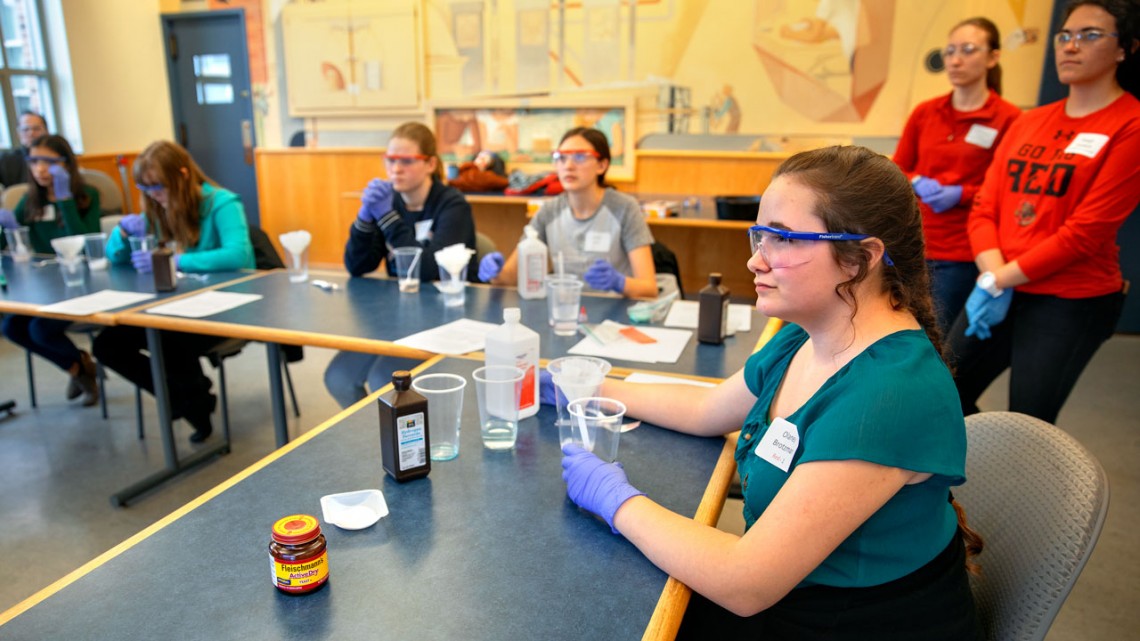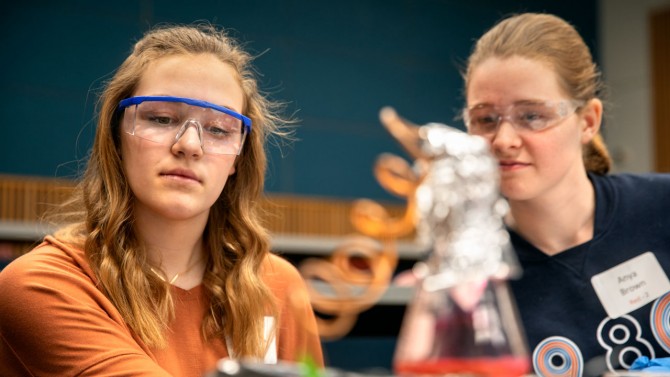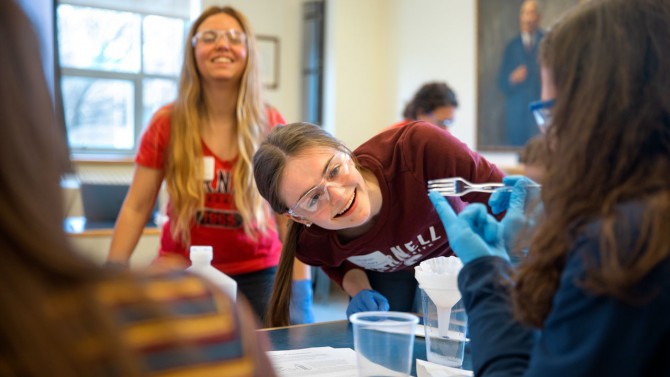
Led by Cornell graduate students, high school sophomores experiment with biological engineering principles during the W.O.M.E.N Outreach event March 16 in Olin Hall.
Girls get glimpse of their future in science
By Matt Hayes
Fifteen-year-old Lauren Moore sees few obstacles to career success standing in her way – and her gender certainly is not one of them.
The high school sophomore from Onondaga Central School District in central New York is not sure which career path she will pursue, but she is confident that science will be a part of her future. It’s a perspective that was solidified during W.O.M.E.N (Women’s Outreach in Materials, Energy and Nanobiotechnology) Outreach, March 16 in Olin Hall.
Moore and 20 other female high school sophomores came to Cornell to explore the world of science and engineering, with hands-on activities led by male and female graduate students.
“It’s encouraging,” Moore said of her prospects for a career in the sciences. “It shows that if other people can do this, especially girls, so can I.”
It’s a marked change from views that dominated in her mother’s generation. Amy Moore, who works in information technology, said that she has encountered professional obstacles related to gender and witnessed many other women face the same.
“It’s been a steep climb, from my view,” she said. “It’s so refreshing that a new generation doesn’t face the same idea that just because you’re a girl, you can’t do a certain kind of science.”
The W.O.M.E.N event was launched in 2010 as a way to encourage female high school students from rural areas to consider technical careers. The program was started by Susan Daniel, associate professor of chemical and biomolecular engineering, along with a graduate student from Deposit, New York, who recognized that rural high school students often have limited opportunities to prepare for the rigorous scientific coursework of college.
And for young girls, even the opportunities present their own challenges.
“There’s a lot of messaging from society that these careers are too geeky or it’s not cool to be a scientist. We are trying to combat that myth,” said Daniel. “This event helps fire up young minds and help them see that they, too, can be scientists.”
This year, students from 12 school districts spread across nine counties in New York, plus two in Pennsylvania, took part in labs focused on biological, process and materials engineering. The students hailed from the Catskills in the east to the far western reaches of the Finger Lakes – exactly the types of rural districts with limited opportunities for science clubs and the Advanced Placement (AP) courses that earn students college credit while still in high school.
“This is our community, and this is the state we serve,” said Daniel. “Cornell has a mission to serve the citizens of New York. There are lots of kids in small towns who don’t have resources, so this is an opportunity to reach that population and give them a sense of the opportunities they could have.”
Hundreds of students have taken part in the program since its inception. According to Daniel, a survey of past participants showed that all those who responded had attended college, and about 80 percent or so were involved in a technical field. A dozen of the students matriculated at Cornell.
Cornell has long promoted diversity in the sciences. In the College of Engineering, half of the freshman undergraduate students are female. It’s a trend that has been gaining traction nationally. Keeping young students engaged, especially those in their sophomore year of high school, is critical to maintaining those gains, Daniel said.
“Sophomore year is the time when students might start shying away from physics, from chemistry,” she said. “We are encouraging them to be bold so that when they get to college they are keeping all those doors open.”
Ferra Pinnock, a doctoral student in the field of chemical and biomolecular engineering and one of 30 Cornell graduate students who volunteered at the event, said the event provided the type of outreach that she wished she had experienced when she was younger.
“As a kid, I wasn’t even aware that science really existed as a career option,” she said. “Now, for me, I realize that having access to role models in these fields – and to the fields themselves – is so necessary and empowering, especially for young girls.”
Briana Hayes, a sophomore from Watkins Glen, New York, said her school only offers a limited number of AP courses. Interacting with the Cornell graduate students was motivational, she said.
“It was really cool to see that there are opportunities in the field,” she said. “I’m really interested now in taking more science courses, more math courses.”
Along with activities for the high school students, the W.O.M.E.N. program offered sessions for the parents. Graduate students spoke about the college experience and answered questions.
Jennifer Moreira-Heinig, whose daughter attends school in the Alfred-Almond School District in western New York, was eager for her daughter to experience Cornell and the potential for science as a career choice.
“The opportunity wasn’t there 30 years ago,” Moreira-Heinig said. “I think there are a lot more opportunities for girls today, but they need to be exposed to the sciences. They can’t just sit in their high school classroom and be so limited that they don’t see what’s out there.”
Media Contact
Get Cornell news delivered right to your inbox.
Subscribe



